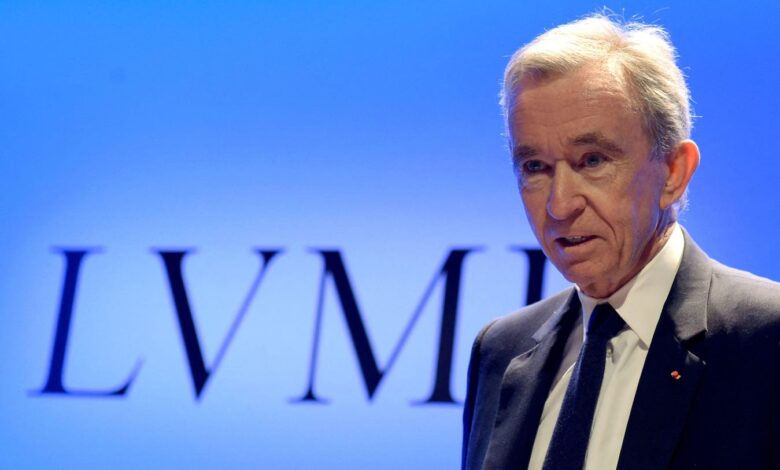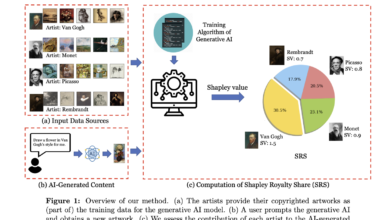LVMH Understands The AI Challenge For Luxury Is Not Technology But The Human Element

French luxury group LVMH Chairman and Chief Executive Officer Bernard Arnault presents the group’s … [+]
Luxury brands are all-in with artificial intelligence technology (AI) and the ways it will revolutionize business. While luxury brands by and large dragged their feet in the e-commerce digital revolution, they aren’t about to let that happen again with AI.
Luxury brands are widely using basic AI for data analysis to forecast demand, in supply chain management and to support other operational uses, but the emergence of generative AI (GenAI) takes AI to a whole new level, both maximizing the opportunities and the challenges.
Basic AI is programmed to analyze data, identify patterns and make predictions. Its scope is limited and its range narrow. GenAI has no such limits. It is programmatically trained to analyze data inputs from multiple sources and create new content and information in a variety of formats, including text, photos, video and audio.
For example, Senator Richard Blumenthal opened a Congressional hearing on the dangers of AI by playing a recorded message of what sounded like his voice saying words he didn’t write. His voice and speech were created by GenAI, but it could have just as easily been a video given GenAI’s power.
GenAI mimics human creativity, though it lacks human cognitive abilities and contextual understanding. It holds the promise to expand human limits and accomplishments, but it has no moral compass or as retail industry analyst Robin Lewis observes, “What it doesn’t deliver is wisdom, insight, and context. It is soulless.”
This is where GenAI becomes problematic for luxury brands that create products representing the highest level of creative achievement and where the person-to-person connection in the marketplace is so essential.
As the luxury market leader, LVMH has the most to gain from AI if used effectively and the most to lose if AI is deployed improperly. And given its scale, LVMH has unmatched resources to discover AI’s potential. That’s why it’s getting the best minds behind it to explore the uncharted waters of artificial intelligence.
It recently hosted a three-day LVMH Data AI Summit in Paris, bringing together students and practitioners to explore innovative AI applications. And it has aligned with Stanford University’s Institute for Human-Centered Artificial Intelligence Institute (Stanford HAI), which is on the forefront of research in the retail sector for AI safety, human-centered design, human-computer interactions and other areas.
“Recent generative AI breakthroughs show new opportunities for major innovation and efficiency but also challenges and risks. LVMH will accelerate the efforts to learn and experience how it can help the business,” the company said in a statement.
Risks And Rewards
Human creativity is the lifeblood of LVMH’s 75 brands, called Maisons, as well as the luxury market in general. If GenAI can enhance that creativity, then luxury brands will gain the most from investments in its capabilities. A Deloitte survey found 20% of retailers plan to use GenAI to augment the creative process.
LVMH recognizes GenAI’s creative potential in the luxury market. “While these technologies offer remarkable creative potential, making it possible to generate bespoke designs and personalized experiences, they also raise questions about authenticity, as well as responsibility,” it stated.
At the same time, luxury brands like LVMH have long recognized the essential role of the human element – the person-to-person connection – in the retail environment. That was the main reason why luxury brands were slow to adopt e-commerce.
This is where the Stanford HAI partnership comes into play. “Stanford HAI’s mission focuses on how to properly design and build human-centered AI to have positive human impacts,” Stanford HAI’s vice director of research James Landay said in a statement.
The statement continued, “The LVMH luxury group will work with faculty and students to better understand current advances in this technology and how to augment employees without replacing them.”
Stanford HAI’s managing director for industry programs and partnerships, Panos Madamopoulos-Moraris, explained:
“We are poised to guide AI’s evolution in creative and consumer industries, an area relatively underexplored compared to enterprise applications. We look forward to working with LVMH, our first European member, as we aim to augment creative minds, enable the safe development of large models in luxury, and translate artificial intelligence into actionable impact, shaping industries that touch lives worldwide.”
More Than Transactions, Luxury Is Customer Experiences
“In luxury retail, customer experience has always been paramount,” Deloitte explained in a report presented at the World Retail Congress entitled “Retail Reimagined: Creating Luxury Customer Experiences Using Data-Driven Insights.”
Deloitte’s report seeks to answer questions about how GenAI can enhance the customer experience in authentic ways, instead of making customers feel they are a cog in a machine being manipulated by technology forces they don’t understand and can’t control.
Luxury brands widely recognize the potential for GenAI to deliver a greater return on investment in marketing. For example, GenAI can be used to personalize messages by creating original content designed for the individual customer to ensure only content that interests them is delivered– a big benefit to consumers whose inboxes and text messages are overflowing.
The International Data Corporation predicts GenAI could improve the productivity of corporate marketing activities by more than 40% over the next five years.
Beyond marketing applications, a Nvidia survey among 400 retail professionals found an overwhelming 86% see the greatest potential for GenAI is to enhance the customer experience, specifically used to assist in product recommendation, virtual shopping and try-on, technologies that LVMH uses most effectively at Sephora and has tested for Dior.
It can also be used to provide sales staff tools to enhance the personal in-store shopping experience, an application of particular value in the human-intensive luxury retail setting.
Caution Advised
It’s when GenAI moves beyond internal operations, like forecasting demand and driving operational efficiencies, into more consumer-facing applications that it gets tricky.
Nvidia reports retailers by and large are taking a cautious approach, citing data privacy and security concerns. The Federal Trade Commission mirrors those concerns, along with potential biases and inaccuracies that could result from machine learning rather than human interaction.
“The introduction of AI presents new layers of uncertainty and risk. The technology is altering the market landscape, with companies moving to provide and leverage essential inputs of AI systems – opening a window of opportunity for companies to potentially seize outsized power in this technology domain,” write FTC authors Simon Fondrie-Teitler and Amritha Jayanti.
A Forbes Advisor survey among 2,000 Americans polled by OnePoll found that a majority of consumers worry about the potential to be deceived or manipulated by businesses using AI.
For example, 70% of consumers are concerned about AI being used in product descriptions and 60% in product reviews. Nearly two-thirds (64%) worry about personalized advertising, 58% find chatbots answering questions problematic and 76% are concerned AI can cause misinformation on a company website.
On the other hand, consumers are less concerned about companies using different personal data to enhance the customer relationship. Some 48% approve of it for past purchase history and actions, while 55% have little problem with retailers tracking their social media usage and engagement. However, fewer are comfortable with AI analyzing their text messages (33%) and phone conversations (21%).
LVMH Takes The Lead
LVMH has been strategically deploying AI for years in inventory management and demand forecasting across its diverse brands, which operate in five distinct luxury sectors: wine and spirits; fashion and leather goods; perfumes and cosmetics; watches and jewelry; and specialty retailing, notably Sephora and Le Bon Marché.
Thus its challenges in dealing with such vast amounts of data are magnified. It can’t lean on a one-size-fits-all approach to AI; instead, it has to customize it to each Maison and the sectors in which they operate.
Some data and learnings cross the boundaries of each Maison, but others are very specific to the brand. The value will be realized by using it all strategically to maximize synergies across brands and geographies while recognizing their distinctiveness.
But most importantly, LVMH must use AI responsibly. “At LVMH we have been promoting human creativity and craftsmanship for decades,” Anca Marola, LVMH chief data officer said in a statement. “In recent years, artificial intelligence has become a powerful assistant that makes us more efficient.
“It’s important to embrace and take advantage of these ground-breaking technologies, but do it in the right way that is virtuous for our future as companies, people and society.”
Human-Technology Connection
LVMH’s work with Stanford HAI will focus on new applications of AI in customer experience, product design, marketing content & communication, manufacturing, supply chain management and other areas.
LVMH group managing director Antonio Belloni added, “Artificial intelligence is a powerful technology. We acknowledge the value that it can bring as support and complement to human talent, emotions and creativity that are core to our Maisons.”
The aim is for LVMH to augment its human talent, resources and operations through AI to better serve customers. Bridging the human-technology gap is where the greatest challenge is, as well as the ultimate opportunity.
However, successfully implementing AI in the luxury market will not be solved by technologists in the back room but by forward-thinking executives and staff members engaged in creative, marketing and customer service roles.
“Luxury is about people. AI is a tool that can shape and improve certain marketing efforts. It doesn’t replace the personal side of business and a full-on luxury AI experience doesn’t exisit yet,” observed luxury market research expert Chandler Mount of the Affluent Consumer Research Company, with which I am affiliated.
A full-on luxury AI experience may not be here yet, but LVMH will be the one to bring it.



